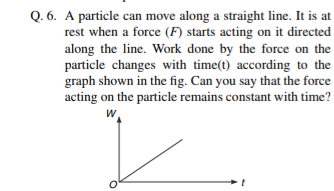In solution to this question we say $dW/dt=$power that is constant so $F.v$ is constant so with time when velocity increase force must decrease.
But the formula $F.v$ is itself valid in cases of constant forces in case of variable forces it must be written as $dW/dt$
And if we assume force to be constant then work done is $W=F.δx$ then displacement will be of the form (some constant ×t^2) and when we divide both expression with time we find that work is a linear function of time. Which contradicts with answer of the question
So where am I making mistake?

